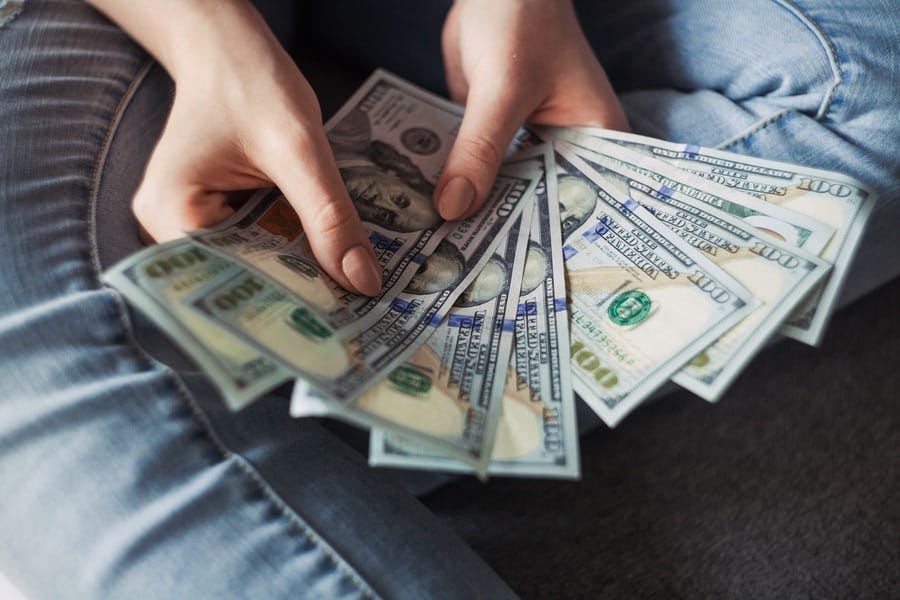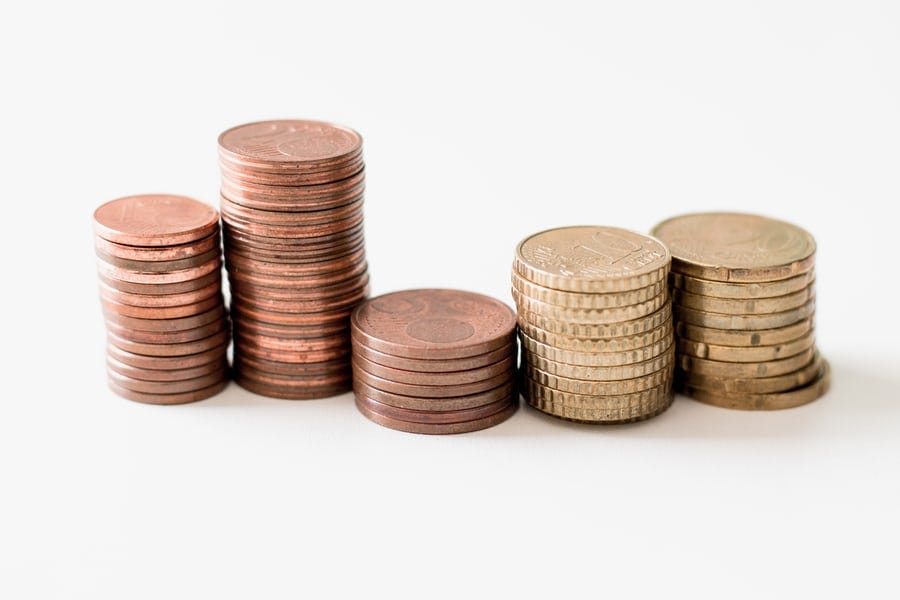Prior to the pandemic, I had been experimenting with this question for a few years until remote work became the norm and my hypothesis flipped on its head!
If you are provided the luxury to skip out on the commute, ~30 min Sweetgreen lunch line, and WFH all day, every day instead, you don’t have to spend a dime to make money.
Generating positive cash flow is found in various ways these days yet when we come to think of it, it usually consists of a career of some sort, commuting to and from a 9–5, and earning standard gross income that increases alongside one’s marginal tax rate.
With the Great Resignation, Reshuffle, Realignment, whatever you decide to consider the sign of the times, you’ve most likely reconsidered or altered your financial habits to take advantage of the Fed’s punch bowl and Congress’ stimis, if you qualified earning less than $75k.
Most of us assume and are convinced we spent less during the pandemic and saved more.
It was too easy to believe.
According to financial reports, analysts, surveys, and strategists, that is partially true. The national savings rate rose to 40% as high as the Great Depression but is now back down to as low as the Great Recession to 5%. With extra cash cushions and a financial buffer on hand, Americans are relentless. Retail sales soared during the holidays which have been reflected in the December 40-year high inflationary reading. Rarely does the economy experience a low unemployment rate, currently at 3.9%, 10 million + job openings, and 6.6 million people quitting their jobs all at the same time!
Consumers have shopped till they dropped and may look better than they really are on paper.
Despite or maybe because of the pandemic, retail sales, blue-chip, and financials soared due to Americans’ resilience, and mainly thanks to the Fed and Congress’ support for the past 2 years.
Back in March of 2020 when the pandemic hit, the financial services industry was crunched with cash reserves and concerned they would need to engage in stock splits and deal with faulty borrowers, foreclosures, and bankruptcies. Thankfully due to the excess cash pumped into the markets at a record pace of $120 billion bond Fed purchases per month and $1200 stimulus checks delivered to those earning under $75k, Americans slowly but surely began to pay off their debt, increase their cash holdings and financial buffer, diversify, invest with over 10 million new brokerage accounts opened in 2021-many of them amateur retail traders, and took advantage of bottom rock interest rates. Fueled by increased mortgage lending, the housing market was on fire, M&A transactions, the IPO and SPAC markets crushed records, and banks were able to increase their cash cushions, deposits and decrease or suspend overdraft fees which rake in over $10 billion per year!
Consumers alike had an unprecedented year. Only time will tell when their balance sheets turn negative from all the pent-up lockdown demand. Hopefully remote work didn’t sabotage their goals in itself. Yet in 2022 with the Fed’s tapering tantrums and hawkish plans, this is certainly spooking bond markets and leading to a more treacherous bumpy road ahead for equities. The Nasdaq fell into correction territory down 10% today, 1.19.22. and the 10-yr Treausury hit it’s highest point in 2 years!

Money Tree
Those that are afforded the luxury to work from home, mainly the laptop class, earning more than $200k annually, are twice as likely to work from home. There are dozens of top 10% income careers that are considered essential and frontline positions but the share of remote high-paying positions is drastically increasing. The laptop class conveniently took advantage of the punch bowl and of course, remote work which alleviated their schedules, costs of commuting, dining, etc. which all takes time especially since time = money at the end of the day.
But if you were a lucky at-home worker who took advantage of this precious time and may have considered it a blessing in disguise, have you really checked up upon how much you’ve spent?
Make sure you keep tabs since far too many have fooled themselves already. You may have refinanced or took out a 30-year mortgage around 3.2% to purchase an upgraded crib, Tesla, flew private a couple times during the pandemic to stay away from crowds, possibly had another munching, ordered more overly priced meal kits and wellness packs, bought a Peloton, and upgraded the tech and gadgets in the home. It was easier than ever to spend, especially at home.
All of this adds up not to mention the basic necessities such as the electricity bill. If you stayed home, I’m sure you wanted it to be comfortable and you’ve definitely flushed, turned on the lights, and heated up your home more than while at work. Here’s what I mean.
All of this must be taken into consideration. Thankfully millions of Americans report being in the best financial position of their lives although the national savings rate shot down to 5%, the lowest since the Great Depression! At least evictions were lower than anticipated and there are more investors than ever before! There’s a lot to be grateful for especially when investing is become mainstream and talked about not just amongst colleagues but also at home, around the neighborhood, and on Zoom happy hours.
Pent-Up Drainage
According to the University of Michigan Consumer Sentiment Index, consumer confidence tumbled to 66.8 in November, representing the lowest level in 10 years. 1 in 4 consumers are reducing their living standards due to these price increases. This low rating is caused by inflationary concerns and fear of ‘a new normal’ where Americans must get used to absorbing higher prices in gas, food, electronics, furniture.
Now the number one thing to consider is how long can this pent-up demand, healthy savings, and strong consumer sentiment last?
Savings rates are melting, the Fed is planning on hiking rates, equities and tech are selling off, and many consumers feel too confident that they will be able to continue their lavish new lifestyles into 2022 with rate hikes.
The number one concern and predictor of how the markets will sway is the Fed. Never fight the Fed for this reason.
Currently, inflation mixed with negative real interest rates and negative yields on capital preservation and liquid securities and cash and cash equivalents such as money-market funds, corporate bonds, treasury securities with varying durations and maturities, CDs and cash aren’t a wise move right now yet cash will always be king no matter what since we must plan for the worst, hope for the best. As interest rates hike, bond prices will lower and yields will hike which will flip the interest in fixed-income. The Fed’s goal is to stabilize the economy, currency, and markets where millions rely on their retirement, college, first home purchase savings, and ultimately life in the market, and it cannot falter or get bruised. It is tightly correlated and reacts momentarily to the Fed’s actions. Although the Fed plans on raising interest rates roughly 3–4x as banks predict at 0.25%, they want to slowly let them climb to cool off inflation and let the supply chain catch up with demand but not at an abrupt pace where Americans lose their footings, dependency on monetary stimulus, and fall into thew ditches again, causing another recession all over again. The Fed has too much power and doesn’t want to hit the brakes too quickly.
This is the reason why Americans must be vigilent about predicting how their money can last them in the future and ask themselves if what they are buying now is helpful and if it will ultimately serve them later on, preferably as an appreciable investable asset.
You may have claimed you ‘saved’ money during the pandemic, but you most likely replaced it with more things that were deemed less expensive although many made the most expensive purchase of their lives, their primary residence. In 2021, 6.49M homes were sold, and collectively $1.61 trillion was borrowed. Currently the national ownership rate is 64.8% back from its peak in 2004 at 70% before risky lending and borrowing with MBS and CDOs led home prices to collapse and millions of Americans lost their savings and majority of their net worth tied to the equity of their homes unable to pay their mortgages.

Start Contributing
Americans should be prepared to pay more, especially when they get back to work. I find it is EXTREMELY hard not to have money in order to make money. Take investing for example. You need a buyer and seller, or bid and ask to place a trade.
When it comes to real life adventures, there is such a thing as rags to riches and we’ve all encountered titans who’ve navigated the journey but it certainly isn’t as common as it once was as markets are becoming saturated, industries are encountering a more skilled workforce, inflation is eating into earnings, and there’s extreme ‘viraness’ around entrepreneurship. Ironically, in a sense, it’s harder to be seen on the internet these days. Gaining a connection requires a time commitment which equates to reduced earnings by the hour. Yet the best investment is in yourself. You must face the truth. Money begets more money. You don’t need to dish out a quarter of a million dollars on a degree to get ahead per se but you do need to continuously invest in your mental and physical self to improve and witness monumental change.
Nowadays with an abundance of robust trading platforms such as Webull to Titan, Robinhood to ETrade, you only need as little as a few dollars to start investing in fractional shares to start building your portfolio. Investing isn’t just for middle aged white men who work on Wall Street anymore. It is for everyone and its mission is to democratize it for all and diversity the industry.
With large expenses such as a home, if you don’t have at least 20% in cash to put down as a deposit, there are many other ways to invest in real estate that don’t restrict you to just a physical tangible real estate which isn’t immediately an asset straight away. Similar to your alternative investments, the golden tax-advantageous rule for a home is if you don’t plan on keeping or holding it for more than 5 years, it’s not worth it since your ongoing tax liability and extra non recoupable fees such as maintenance, insurance, closing costs, taxes, etc. can add up to more than the capital gains you generate.
Luckily, eREITS, real estate investment trusts are publicly traded companies that invest in a variety of properties across the country that gives you immediate exposure to hot housing markets without having to maintain the property or ever deal with tenants. These range from apartments to commercial properties, studios, multi family properties, and subdivision homes. Since 90% of a REIT’s income needs to be paid out in dividends, this is a nice way to earn a sizable quarterly or yearly cash payment while having exposure to the market in the areas of your choosing. Plus with platforms such as CrowdStreet, YieldStreet, and Fundrise (not sponsored), crowdfunding is another attractive way to gain more real estate exposure that isn’t tied to the market. These are private companies where you need to create a separate account with a minimum balance to invest in their larger assortment of properties. If there’s a will, there’s a way! You don’t have to go for the priciest ticket straight from the start. Although physical tangible real estate will provide you more exposure into an uncorrelated stable asset class, utility, earnings potential, and appreciation than these offerings, there’s always an alternative route to everything in life and expect it to always require some kind of investment to generate rewards later on.
Lastly, the most obvious case with needing money to make more is with our time. We tend to associate this with our jobs and commute. Doing the job itself requires your time, commitment, diligence, and effort which is money after all. There’s an opportunity cost to everything, even during low-interest rate times. Make sure you aren’t fooling yourself on how much you are spending. You are worth it. Everyone’s time is precious but also be comfortable wasting a little or as much as you may believe! The younger we are, the easier it is to do this. We waste countless hours per day deciding what we will eat, wear, watch — how about ‘waste’ that time in a better way by experimenting, trial and error, learning and improving upon mistakes, and seeing what you are capable of without a monetary investment? You’ll be surprised!
That’s how we learn and grow. It’s okay and normal to spend money to put in the investment into something you want to receive a bigger reward from later on. That’s normal and part of the working world and how goods to services, trades, and sales, and life progresses.
If you put in the work, the work will work for you. Be wary of free deals or something that looks too good to be true. For many things in life and to accomplish your dreams, it isn’t realistic or a requirement to have X amount of dollars, take X course, or go to X school. According to countless studies, most students who excel at school or are provided everything since birth don’t end up being the real visionaries or change-makers you see in the world. Instead, tap into your human potential and unleash your dedication, grit, and stamina. As they say, eventually through unwavering commitment and dedication, you will get somewhere! The problem will most people is that they quit far too soon. Be in the top 1% by simply continuing. Looks easy but seems impossible to most. Failure is a horrible feeling but nothing is worse than not trying.
Sometimes you will waste money on things that didn’t pan out and other times, opportunities come out of sheer luck and timing! No matter what happens, always strive to invest in yourself through good nutrition, a healthy mind, and a strong body. To reach the top, and there’s always room for everyone, you need to be able to deal with setbacks and not take everything so personally or seriously, especially yourself. Evaluate and take calculated risks to stay on track to eventually meet the right people and let them take you places and meet other leaders for free!
There’s always an opportunity and chance as long as you are willing to put in the investment for as long as it takes. It won’t be free of charge later on.

